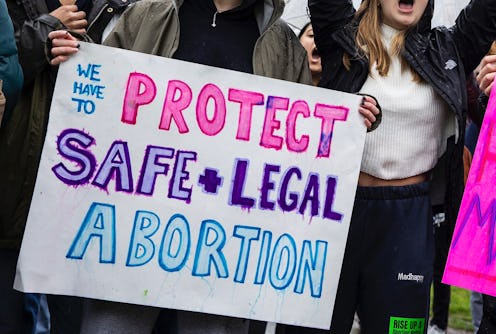Take Action
How To Fight For Reproductive Rights, Based On How Much Time You Have
You can take action no matter your schedule.

On June 24, 2022, Roe v. Wade was overturned in a supreme court ruling that enacted outright bans or severe restrictions on abortion access due to trigger laws. Originally passed in 1973, the landmark case legalized the right to abortion in the United States, ensuring that people across the country would have access to safe and legal abortion regardless of individual state legislation. Due to this decision, 13 states with trigger laws were immediately affected and a year after the ruling, 13 additional states have extreme restrictions on abortion access.
“You can channel your outrage into action and make a big difference, even if you only have a few minutes,” Jessica Arons, the ACLU’s senior advocacy and policy council for reproductive freedom previously told Bustle, adding that donating, gathering signatures, and having discussions about abortion with loved ones are all ways to take action.
If you want to get involved to continue the fight for reproductive rights nationwide or on a local level, here are some steps you can take no matter how much time you have to spare.
If You Have 10 Hours, You Can Volunteer Your Time
If you have a free day and a desire to join the fight with boots on the ground, consider volunteering.
Jay Thibodeau, communications director for the Abortion Care Network, an organization focused on patient-centered abortion care nationwide, tells Bustle that supporting local clinics is one way to assist in the fight for abortion rights. “There are incredible clinics, organizations, and networks out there already, and they need your help,” they say. “The people who work at these centers are experts and know how to do this work in a way that keeps everyone safe and supported including patients, providers, and volunteers. Reach out to offer your help and be patient as these small, grassroots organizations work through responding [to the ongoing news].”
When volunteering at an abortion clinic, you’ll most likely be trained to escort patients in and out of the building, assist in data entry, and help organize educational programs as well.
If You Have 5 Hours, You Can Visit Your Clinic Or Attend A Protest
Another way to show solidarity for reproductive health clinics is to attend them when you need care. Similar to a local bookstore or small business, reproductive clinics need customers to survive.
“Many clinics provide a whole range of services from birth control to gender-affirming hormone therapy to prenatal care to STI and cancer screenings,” says Thibodeau. “Find out what the clinic in your region offers and go to them for the reproductive health care you need. Not only will you get compassionate, affordable care from expert providers, you’ll help keep that clinic open for all who need it.”
You can also take action by peacefully protesting in your community for reproductive rights. If you are going to protest, take precautions like studying the space around you, writing down emergency phone numbers, and being aware of the way you are engaging with law enforcement.
If You Have 1 Hour, You Can Donate Money
Donating directly to independent abortion clinics and abortion funds is the quickest way to aid in this fight. “Clinics and funds desperately need support all year, not just in times of crisis,” says Thibodeau. Donating to independent clinics at keepourclinics.org and to abortion funds at abortionfunds.org is a good place to start. This list has 23 abortion funds that specifically assist people in states with more restrictions.
If You Have 20 Minutes, You Can Spread Awareness
In just a few minutes, you can make a difference by spreading awareness to those around you. Reach out to folks in your life and be sure they’re aware of the resources offered in their state and of the organizations they can turn to should they require help.
Websites like IneedanA.com offer comprehensive, verified directories of abortion clinics by zip code, and offer practical support about appointments and state-by-state restrictions. “You can also text 202-883-4620 for the three clinics closest to you by zip code,” says Thibodeau. “It’s free and you don’t need internet access or a smartphone.”
Starting conversations in your community and ensuring that your family and friends know how to access abortion care should they need it is another way you can spend your time.
Sources
Jessica Arons, Senior Policy Counsel ACLU
Jay Thibodeau, communications director Abortion Care Network
This article was originally published on